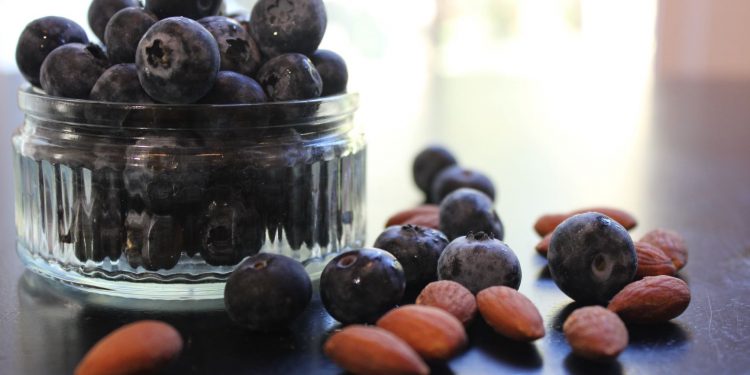by Sierra Fawn Guay, MS, RDN, LDN, CBIS
The foods that we eat affect the health of our brains in many ways. Diet is one of the primary factors in blood sugar control and can have both short- and long-term consequences for our brains.
Normally, the foods we eat are digested into smaller parts. One of these parts is glucose, which is also known as sugar. Sugar is absorbed from the gut into the blood where a hormone called insulin helps bring it into the body’s cells for use as energy.
Some individuals become resistant to insulin and are not able to effectively use insulin to bring sugar into their body’s cells. To compensate for this, the body releases extra insulin, which accumulates in the blood. An enzyme called insulin degrading enzyme helps clear the extra insulin from the blood.
Normally, insulin-degrading enzyme helps clear a substance called beta amyloid from the brain. When insulin-degrading enzyme is used up during the task of clearing extra insulin from the blood, beta amyloid accumulates and forms plaques. Beta amyloid and the plaques that form are thought to play a role in cognitive decline and the development of Alzheimer’s disease. Also, extra insulin may hinder the function of the neurotransmitters acetylcholine and norepinephrine, which are important for cognition.
One cause of insulin resistance is the chronic consumption of high-sugar foods (also called a high-carbohydrate diet). In the short term, so much sugar can affect memory and cause anxiety, depression, and mood swings. In the long term, it can lead to the development of Type 2 diabetes. Type 2 diabetes is a major health problem in the United States and is a risk factor for many health conditions, including stroke. In order to avoid insulin resistance and Type 2 diabetes, it is important to control blood sugar.
For most people, carbohydrates are an essential part of a healthy diet. Eliminating all carbohydrates from the diet is rarely appropriate and should only be considered under the supervision of a doctor and dietitian. There are many diet-related strategies that can help control blood sugar.
Eat smaller meals every few hours versus one large meal per day. It is normal for blood sugar to go up after eating. Eating smaller amounts of foods more frequently will help avoid large swings from low to high blood sugar.
Eat balanced meals and snacks. Meals and snacks should include carbohydrates, protein, and fat. Eating balanced meals and snacks helps slow the absorption of sugar into the blood and helps ensure an overall healthy diet.
Creating balanced meals does not have to be difficult. Consider a meal of pasta with tomato sauce, which is almost entirely carbohydrates. To add protein, one could add meat to the tomato sauce or serve the meal with meatballs.
Portion control is essential in controlling blood sugar. If you are consistently consuming large portions of carbohydrates, for example, you will consistently have high blood sugar. Consider the pasta meal described above. In order to keep the portion of pasta to an appropriate size, one could decrease the amount of pasta and add roasted vegetables.
To learn more about appropriate portion sizes, visit www.choosemyplate.gov/
Choose healthy carbohydrate options. Carbohydrates are an essential part of a healthy diet. However, not all carbohydrates are equally healthy. Carbohydrates that come from whole foods such as whole grains, starchy vegetables, and fruits contain important vitamins and minerals. They also contain fiber, which helps slow the absorption of sugar into the blood. Refined sugars, such as those in processed foods, desserts, and soda, provide little nutritional value. Intake of refined sugars should be limited or avoided.
Talk to your doctor to learn more about healthy blood sugar levels, which may vary by individual. Blood sugar can be tested at home with a device called a glucometer. If you do not own a glucometer, you can look for signs of high blood sugar, which includes increased thirst, dry mouth, frequent urination, blurred vision, and fatigue.
—–
Balanced Snack Ideas to Help Control Blood Sugar
- 1 cup of grapes + one hard-boiled egg
- 1 cup blueberries + about 15 almonds
- 2 tbsp hummus + cucumbers or whole-grain crackers
- 1 apple + 2 tbsp nut butter
Sierra is a registered dietitian who works with brain injury survivors in Greenville, North Carolina.











